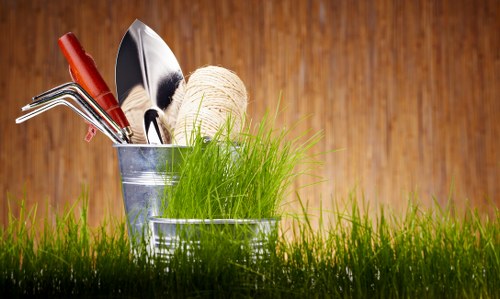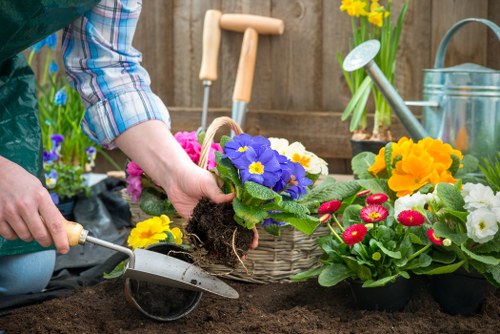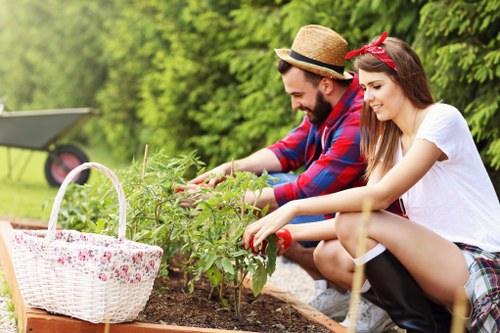Comprehensive Guide to Garden Maintenance in Barbican
Introduction to Garden Maintenance

Maintaining a beautiful garden in Barbican requires dedication, knowledge, and the right techniques. Whether you're a seasoned gardener or a beginner, understanding the essentials of garden upkeep can transform your outdoor space into a vibrant and serene retreat.
Garden maintenance involves various tasks such as pruning, weeding, fertilizing, and pest control. Each of these plays a crucial role in ensuring that your plants thrive and your garden remains healthy throughout the seasons.
In this article, we'll delve into comprehensive strategies and tips for effective garden maintenance, tailored specifically for the unique climate and conditions of Barbican.
Understanding Barbican's Climate

Barbican experiences a temperate maritime climate, characterized by mild summers, cool winters, and consistent rainfall throughout the year. This climate influences the types of plants that can thrive and the maintenance practices required to keep them healthy.
Choosing the right plants that are resistant to local pests and adaptable to the climate can significantly reduce maintenance efforts. Additionally, understanding seasonal changes allows gardeners to prepare and protect their gardens effectively.
Proper garden planning in Barbican involves selecting native plants, which are more likely to flourish with less intervention, and implementing sustainable practices that align with the local environment.
Essential Tools for Garden Maintenance

Having the right tools is fundamental to efficient garden maintenance. Essential tools include:
- Pruners: For trimming and shaping plants.
- Garden Fork: Ideal for turning soil and aerating the ground.
- Hand Weeder: Helps in removing weeds without disturbing nearby plants.
- Watering Can or Hose: Ensures plants receive adequate moisture.
- Gloves: Protects hands from thorns, dirt, and potential irritants.
Investing in high-quality tools not only makes maintenance tasks easier but also ensures longevity and better performance over time.
Regularly maintaining your garden tools, such as cleaning and sharpening blades, can extend their lifespan and maintain their effectiveness.
Pruning and Trimming Techniques

Pruning is essential for promoting healthy growth and maintaining the shape of your plants. Proper pruning techniques involve:
- Identifying Dead or Diseased Branches: Remove any parts of the plant that show signs of damage or disease.
- Shaping the Plant: Trim to maintain the desired form and encourage balanced growth.
- Thinning: Remove excess growth to improve air circulation and sunlight penetration.
Regular trimming not only enhances the aesthetic appeal of your garden but also prevents overcrowding, which can lead to pest infestations and reduced plant vitality.
It's important to use clean, sharp tools to make precise cuts, minimizing stress on the plants and promoting faster healing.
Weed Control Strategies

Weeds compete with your garden plants for nutrients, water, and sunlight. Effective weed control involves:
- Manual Removal: Regularly pulling weeds by hand ensures they don't establish a strong root system.
- Mulching: Applying a layer of mulch can suppress weed growth and retain soil moisture.
- Use of Organic Herbicides: When necessary, opt for eco-friendly herbicides to manage stubborn weeds.
Implementing a combination of these methods can significantly reduce weed proliferation, maintaining the health and appearance of your garden.
Preventative measures, such as planting ground covers, can also help inhibit weed growth by occupying space and resources.
Fertilizing and Soil Health
Healthy soil is the foundation of a thriving garden. Fertilizing provides essential nutrients that support plant growth and resilience.
Choosing the right fertilizer depends on the specific needs of your plants. Organic options, such as compost and manure, improve soil structure and fertility over time.
Regular soil testing can help determine nutrient deficiencies, allowing you to apply targeted fertilizers and amendments for optimal plant health.
Pest Management in Barbican
Pests can significantly impact the health of your garden. Effective pest management strategies include:
- Integrated Pest Management (IPM): Combines biological, cultural, and chemical practices to control pests sustainably.
- Natural Predators: Encouraging beneficial insects like ladybugs and lacewings can naturally reduce pest populations.
- Organic Pesticides: When necessary, use environmentally friendly pesticides to minimize harm to beneficial organisms.
Regular monitoring and early detection of pests are crucial in preventing major infestations and maintaining garden health.
Maintaining plant diversity can also deter pests by disrupting their preferred food sources and habitats.
Watering Practices for a Lush Garden
Proper watering is vital for plant survival and growth. Overwatering can lead to root rot, while underwatering causes stress and wilting.
Implementing efficient watering practices, such as drip irrigation or soaker hoses, ensures that water is delivered directly to the roots, minimizing evaporation and waste.
Watering early in the morning or late in the evening reduces water loss due to evaporation and allows plants to absorb moisture more effectively.
Seasonal Garden Maintenance Tips
Each season brings unique challenges and opportunities for garden maintenance:
- Spring: Focus on planting new flowers, pruning, and preparing beds for the growing season.
- Summer: Maintain consistent watering, deadhead spent blooms, and manage pests.
- Autumn: Clean up fallen leaves, protect plants from frost, and prepare for winter.
- Winter: Plan for the next growing season, mulch beds, and protect sensitive plants from extreme cold.
Adapting your maintenance routine to the changing seasons ensures year-round garden health and beauty.
Using seasonal compost and fertilizers can also replenish soil nutrients and prepare plants for the upcoming growth cycles.
Maintaining Garden Tools and Equipment
Well-maintained tools and equipment are essential for efficient garden maintenance. Regular upkeep includes:
- Cleaning: Remove dirt and debris after each use to prevent rust and damage.
- Sharpening: Keep blades sharp for clean cuts and better performance.
- Storage: Store tools in a dry, organized space to extend their lifespan and ease of access.
Proper maintenance not only enhances tool performance but also ensures safety during garden tasks.
Investing in quality storage solutions, such as tool sheds or racks, can help keep your gardening area neat and tools easily accessible.
Enhancing Garden Aesthetics
Aesthetics play a significant role in garden maintenance. Incorporating elements like:
- Pathways: Define spaces and add visual interest with stone or gravel paths.
- Lighting: Highlight plants and create ambiance with outdoor lighting.
- Decorative Features: Add sculptures, fountains, or birdbaths to enhance visual appeal.
These features not only beautify your garden but also create a more enjoyable outdoor living space.
Regularly reassessing and updating garden design elements can keep your garden fresh and inviting.
Sustainable Gardening Practices
Embracing sustainable practices ensures that your garden is environmentally friendly and resilient. Key practices include:
- Composting: Recycle organic waste into nutrient-rich compost for your garden.
- Rainwater Harvesting: Collect and use rainwater for irrigation, reducing water consumption.
- Native Plant Selection: Choose plants native to Barbican to support local biodiversity and reduce maintenance needs.
Implementing these practices not only benefits the environment but also contributes to a healthier, more sustainable garden.
Encouraging wildlife, such as birds and beneficial insects, can improve garden health and reduce pest problems naturally.
Conclusion: Achieving a Thriving Garden in Barbican
Maintaining a garden in Barbican involves a combination of understanding the local climate, selecting appropriate plants, and implementing effective maintenance practices.
By following the strategies outlined in this guide, you can ensure that your garden remains vibrant, healthy, and a source of pride.
Remember, consistent care and attention are key to a beautiful and thriving garden.
Get Started with Your Garden Maintenance Today
If you're ready to transform your garden in Barbican, don't hesitate to contact us today for expert advice and professional maintenance services. Let us help you create and sustain the garden of your dreams!
Book your service now and take the first step towards a stunning outdoor space.
